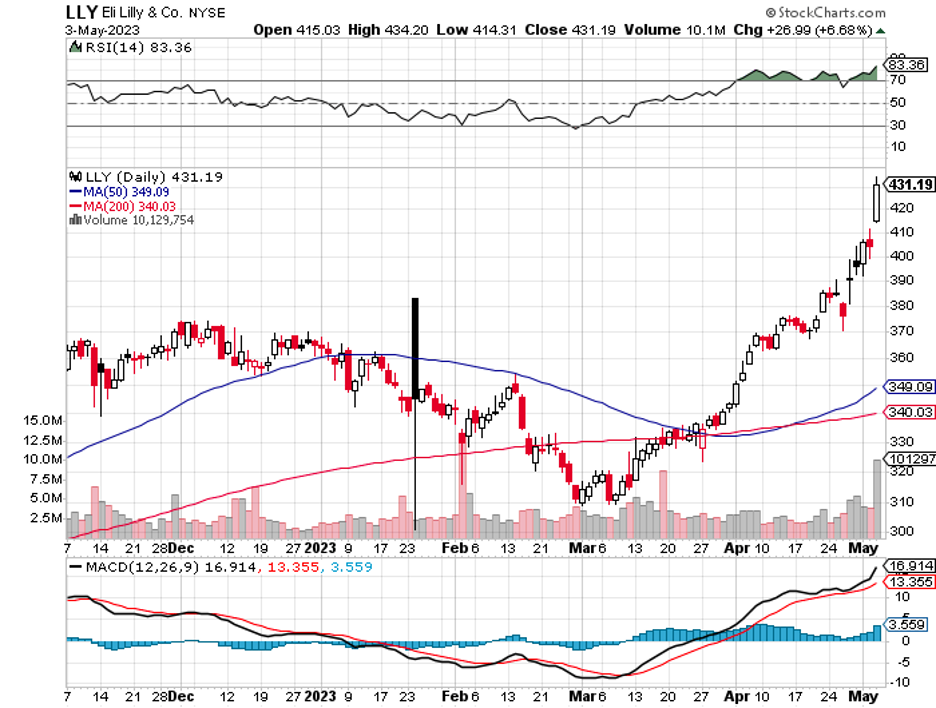The Biopharma That Keeps Beating the Odds
If you're on the hunt for a stock that has a history of outperforming the market, then Eli Lilly (LLY) may have caught your attention.
Unlike many dividend and pharma stocks, Eli Lilly has a knack for beating the market. Just take a look at the company's shares, which have skyrocketed by 153% since the end of April 2020. That's three times more than the market's return of only 50% during the same period.
Now, I know what you're thinking - is this performance sustainable? After all, with a tumultuous economic and market environment causing investors everywhere to hit the brakes, it's possible that Eli Lilly's past success might not be repeated. Some may question whether this stock is still worth buying now or if they've missed the boat altogether.
Investors are always on the lookout for a good deal, so it's natural to question whether Eli Lilly is still a worthwhile investment following a less-than-stellar first-quarter earnings report.
Like many companies in the healthcare industry, Eli Lilly felt the pandemic's impact on its bottom line. Its coronavirus therapeutics segment contracted, leading to an 11% drop in sales to approximately $7 billion and a 38% decrease in EPS to $1.49.
But don't let the numbers scare you off just yet.
The decline in coronavirus sales was expected, and the company's other medicines saw a 10% YoY increase in revenue. Besides, it's essential to remember that a single quarter's results don't necessarily reflect a company's long-term value for dividend investors.
While Eli Lilly may have taken a hit, it's still a company with plenty of potential for the future.
That is, Eli Lilly’s expansion journey isn't about to stop anytime soon. For one, the pharmaceutical giant is waiting for regulators to approve four programs, including donanemab, a treatment for Alzheimer's disease, and tirzepatide, which could help combat diabetes and obesity.
If approved, Eli Lilly's latest offerings will enter contested markets, but there's still a substantial opportunity for them to outperform their competitors and gain market share, particularly with tirzepatide. Although the company may not see rapid revenue growth as a behemoth drug company, with 21 programs in phase 3 clinical trials, moderate-paced growth is still on the horizon.
Going back to its Alzheimer’s treatment candidate, it looks like the company has finally found a working formula to combat this lifelong disease.
Recently, Eli Lilly released positive results from the latest phase 3 study of its donanemab treatment for early Alzheimer's disease. The news pushed the stock to soar over 6% today, tacking over $20 billion to the company's market value.
Dubbed the Trailblazer-ALZ 2 study, the trial aimed to determine whether donanemab could help slow the debilitating effects of Alzheimer's by reducing the decline in a key rating scale of Alzheimer's-induced impairment. And the results? They were nothing short of promising.
Patients taking donanemab experienced a 35% reduction in the rate of decline, and a 40% smaller decline in their ability to perform daily activities, even 18 months into the study.
And that's not all: nearly half of the participants, a whopping 47%, showed no decline on a scale measuring clinical dementia after a year of treatment - compared to just 29% taking a placebo.
This is fantastic news for Eli Lilly and for the millions of people suffering from Alzheimer's worldwide. With such promising results, the company's donanemab treatment could be a game-changer in the fight against this devastating disease.
In comparison, Biogen (BIIB) and Eisai's (ESALY) Leqembi slowed cognitive decline by 27% compared to placebo in a similar patient group.
Notably, the trials for these two drugs had vital differences, so direct comparisons are difficult to make at this stage. Nevertheless, Lilly is determined to move forward with donanemab, despite the risks associated with the drug.
If approved, donanemab could help patients maintain their cognitive function for longer, allowing them to continue their daily activities such as managing finances, driving, and engaging in hobbies.
Thus far, Eli Lilly's donanemab has shown a potential best-in-class clinical profile, leading to the company planning to file for FDA approval later this quarter.
The estimated peak sales for the drug have yet to reach a consensus due to shifting clinical profiles and changing market dynamics over the past year. However, the market's initial estimate suggests it could reach $5 billion-plus per year, as evidenced by Lilly's $20 billion increase in market capitalization following the announcement.
While this estimate may seem reasonable, it's important to note that there is a safety signal in the latest clinical data - brain swelling - that could potentially hinder the drug's commercial uptake. Full trial results will be crucial for investors to consider once they become available.
Nonetheless, the dire need for new Alzheimer's therapeutics and the significant untapped market make the drug's potential highly compelling.
Overall, Eli Lilly is an excellent long-term investment. It has a long history of success, and its strong position in the pharmaceutical industry speaks volumes. While there are no guarantees when it comes to the stock market, this biopharma has a proven track record of delivering impressive returns to its shareholders.
Despite its current high price tag, this leading pharmaceutical company has some exciting growth prospects that could make it the top dog in healthcare before the decade is out. With drugs like donanemab, a potential game-changer for Alzheimer's treatment, and Mounjaro, a type 2 diabetes medication with promising results, Eli Lilly's stock may indeed be worth considering for investors looking for growth potential.


